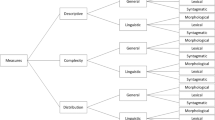Summary
The underlying algorithm can be used for automatic indexing. It is supposed to analyze every inflected German noun automatically by reducing it to its proper standard form and by distinguishing every inflected noun from non-inflected ones. The algorithm starts out with two presuppositions:
-
1.
Nouns first of all must be considered to be the key words for automatic indexing as they contain the most relevant information of all parts of speech, and as they have statistically the greatest frequency.
-
2.
Since in German we use capital letters for every noun we are able to distinguish homographs of parts of speech to a large extent.
The testwords are to be looked up in an automatic dictionary and after the complete analysis we get either the correct analysis of the testword or the result that the testword is not contained in the dictionary. The algorithm uses a maximum of four pieces of information with every word: inflectional group singular (1–9), inflectional group plural (1–10); information about the umlaut in the plural or/and the change of β to S S both depending on the inflectional system. The algorithm is supposed to give the following results:
-
1.
The correct analysis of every German noun including foreign words, loan words and exceptions.
-
2.
Automatic recognition of inflected and non-inflected noun homographs.
-
3.
The impossibility of wrong analyses.
-
4.
The algorithm works with a minimum of dictionary operations.
-
5.
The dictionary can be relatively small according to the number of special terms which the specialist considers necessary for his field or for his special task.
Similar content being viewed by others
Abbreviations
- INF:
-
INFINITVE
- PS:
-
PERSON
- PRÄS:
-
PRESENT TENSE
- SG:
-
SINGULAR
- PL:
-
PLURAL
- NOM:
-
NOMINATIVE
- GEN:
-
GENITIVE
- DAT:
-
DATIVE
- ACC:
-
ACCUSATIVE
- FLS:
-
INFLECTIONAL GROUP SINGULAR
- FLP:
-
INFLECTIONAL GROUP PLURAL
- UML:
-
UMLAUT DEPENDENT ON INFLEXION
- KW:
-
CHANGE OF ß — SS
- KTABS:
-
TABLE OF CASE COMBINATION SINGULAR
- KTABP:
-
TABLE OF CASE COMBINATION PLURAL
- KKZS:
-
ENCODED NUMBER OF CASE COMBINATION SINGULAR
- KKZP:
-
ENCODED NUMBER OF CASE COMBINATION PLURAL
- NAG:
-
COMBINATION OF NOM, GEN, ACC
References
Admoni, V. G.: Stroj sovremennogo nemeckogo jazyka (Der deutsche Sprachbau), 2. Auflage. Moskau, Leningrad 1966.
Braun, S., Schott, G.: Studien zur automatischen syntaktischen Analyse russischer Texte, TU-Berichte, Nr. 6910, München 1969.
Braun, S., Schott, G., Reber, N.: Studien zur automatischen syntaktischen Analyse russischer Texte, Teil II, TU-Berichte, Nr. 7008, München 1970.
Erben, J.: Deutsche Grammatik. Ein Leitfaden, Fischer-Bücherei Nr. 904, Hamburg 1969.
Griesbach, H., Schulz, D.: Grammatik der deutschen Sprache. München 1962.
Heringer, H.-J.: Deutsche Syntax, Göschen-Reihe Nr. 1246/1246a, Berlin 1970.
Jude, W. K.: Deutsche Grammatik, 3. Auflage. Braunschweig-München 1954.
Klein, W., Rath, R.: Automatische Lemmatisierung, Arbeitsbericht Nr. 10. Linguistische Arbeiten des Germanistischen Instituts und des Instituts für Angewandte Mathematik der Universität des Saarlandes, Saarbrücken, Juni 1971.
Lehmann, W. P.: Stachowitz, R., Research in German-English Machine Translation on Syntactic Level, RADC-TR-69-368, vol. II, Final Technial Report, Austin, Texas 1970.
Maas, D.: Homographie und maschinelle Sprachübersetzung = Beiträge zur Linguistik und Informationsverarbeitung, Heft 21 (1971), p. 7–35.
Mater, E.: Rückläufiges Wörterbuch der deutschen Gegenwartssprache. Leipzig 1965.
Mel'čuk, I. A.: Morfologičeskij analiz pri mašinnom perevode = Problemy kibernetiki, vyp. 6 (1961), p. 207–276
Salton, G.: Automatic Information, Organization and Retrieval, McGraw Hill 1968.
Zimmermann, H. H.: Zur Auflösung von Mehrdeutigkeiten bei einer maschinellen Analyse des Deutschen = Beiträge zur Linguistik und Informationsverarbeitung, Heft 21 (1971), p. 36–49
Author information
Authors and Affiliations
Additional information
The German version of the text is available at the Mathematisches Institut TUM, D-8000 München 2, Arcisstr. 21, Bericht Nr. 7210.
Rights and permissions
About this article
Cite this article
Schott, G. Automatic analysis of inflectional morphems in German nouns. Acta Informatica 1, 360–374 (1972). https://doi.org/10.1007/BF00289515
Received:
Issue Date:
DOI: https://doi.org/10.1007/BF00289515



